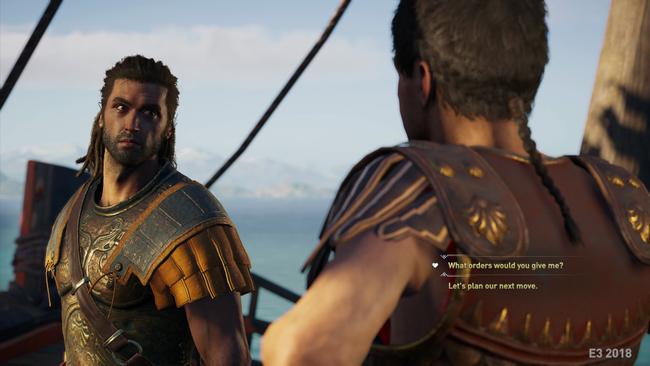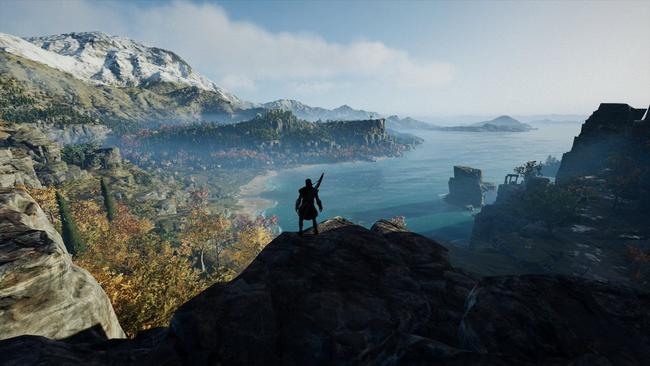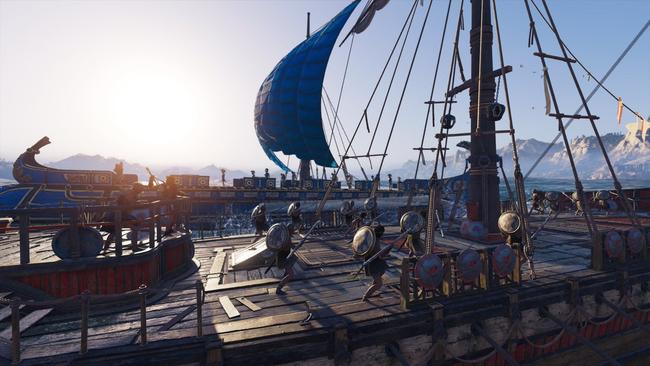
Assassin's Creed: Odyssey Review
It’s been a little less than a year since Ubisoft released Assassin’s Creed Origins, a soft-reboot of sorts to this iconic franchise. Assassin's Creed: Odyssey takes it a step further and places you in the shoes of either Alexios or Kassandra, a descendant of the legendary Leonidas, as they work to unearth the secrets of Ancient Greece with the spear of their ancestor in hand. While it definitely feels like a compelling story with loads of new features to try out and an extremely huge map to explore, Odyssey isn’t without its share of problems.
.jpg)
Odyssey follows similar narrative beats as previous Assassin’s Creed titles; you begin as someone who is relatively inexperienced or unfamiliar with the happenings of the Assassin’s Creed universe, and you eventually grow familiar with a mysterious organization that aims to control the fate of humanity by some sinister means. In between the big storyline beats there are some deviations, mostly regarding the personal elements and familial relations the hero character, which are by far the most compelling part of the narrative. Playing as Alexios or Kassandra doesn’t impact the narrative in any great way, the dialogue between the characters is 1:1 and the choices presented to both are exactly the same.
The characters themselves just serve as a skin for the player as they travel through ancient Greece as their personalities aren’t distinct from one another. Instead, their character is formed by the decisions you make through conversations or actions taken within the in-game world. New to Odyssey, conversations now have different branching paths where players can choose from anywhere from two or four different sets of answers, giving you some small measure of autonomy.
It’s important to note that not all of the options given to the player reflect the dialogue, as they’re sort of a brief summary as to how Alexios or Kassandra will react to certain situations - similar to the systems in seveal BioWare games. Like those games, this can sometimes be frustrating: these options can be inconsistent when addressed in the story as it’s clear there are preferred paths for you to take, despite there being a total of nine different endings for the game.

The same can be said regarding the romances in the game. It's nice to have many romance options, but ultimately they're all inconsequential to the greater story. Assassin’s Creed Odyssey's world is packed with characters you can encounter and romance. Some are introduced through the main story, others through optional side quests.
Truth be told, these ‘relationships’ are extremely short-lived and once your interaction with the character you’ve chosen to chase is over you won’t be able to interact with them again. Sometimes these characters have a continuing presence in the world, but only up until you exhaust these options or end their personal quest-line, ending their romance and ability to interact with the player. If you were looking for something comparable to what BioWare’s RPGs have had to offer in terms of romance or companions, Odyssey probably won’t scratch that itch for you.
I feel like it’s important to mention that there were instances in which characters I was available to interact with in some romantic or sexual way were reduced to extremely harmful stereotypes, especially regarding queer men. Once such instance, which was unavoidable as this encounter was written into the main story - and I honestly wanted to take a break from the game after seeing queerness conflated with zoophilia and sexual deviancy. There were several other instances of characters being written into stereotypes but that story beat stood out as the most egregious.
.jpg)
The moment-to-moment action of Odyssey has remained mostly the same from Origins with the exception of some new skill related additions to combat. Players can choose to utilize skills from three different skill trees (none of which branch out excessively) to complete their objectives. The Hunter, Warrior, and Assassin skill paths are pretty self-explanatory; the Hunter path primarily focuses on amplifying your damage with the bow with the ability to tame animals like wolves to help you during combat, the Warrior path is for close quarters combat which is extremely useful for Conquest Battles, and the Assassin path helps amplify your damage for assassinations, adds poison to your weapons and at higher ranks can even allow you to turn invisible for brief periods of time.
I enjoy the stealth aspects in the Assassin’s Creed games so I naturally filled out most of my Assassin skill tree with the exception of a few Hunter and Warrior perks. Leveling up is required for acquiring passive and active skills through these skill trees with players receiving one skill point per-level similarly to Assassin’s Creed Origins.
Some skills and upgrades are locked off through level and story progression, so you might not have the build you’re aiming for until the last few hours of the game. Grinding can be circumvented somewhat as the in-game store returns (along with cash shop purchases) where players can use Helix, one of two in-game currencies, to purchase EXP boost packs and weapons. Some Ubisoft points carried over from my playthrough of Origins and I was quick to use them on temporary EXP boosts and weapons to gain experience and level up faster to flesh out my build a bit more. Adrenaline returns in Odyssey, but now works as an AP bar of sorts, as one of four or more bars of adrenaline is consumed upon using an active skill from any three skill paths. Regaining adrenaline is simple as all you need to do is kill an enemy to build up or fully replenish one bar.
New combat oriented features include Conquest Battles (as mentioned above) which involve going to a point on the map indicated by a flag once you’ve worn down the hold of the enemy faction in your current region to participate in a fairly straightforward battle. The area is then swarmed with large armies from both your faction and the enemy’s in an attempt to mimic some scale of epicness, but often does so to little effect. Once initiated, players will need to find enemy captains to burn down the moral of the opposing faction before their own bar is depleted, which is shown near the bottom of the screen. You can kill normal soldiers as well to thin out the ranks of your enemy, but it’s generally the best option to go right for the captains and kill them as fast as possible. Stealth is not an option in this style of encounter, but you can use skills from your Assassin skill tree to your benefit such as poisoning your weapon or using Heroic Strike to sometimes instantly decimate a captain or inflict heavy damage.
I have to admit I didn’t enjoy these parts at all since the combat in Odyssey is fairly bland and rarely ever skill-based. Damage is determined by percentiles placed on gear and player levels yet again, so if you’re out-geared and underleveled you probably won’t be able to win an encounter as it just isn’t possible. If more finesse was required for these encounters then I would probably be more partial to them.
.jpg)
Unfortunately, even fights against more impressive enemies fall victim to this system in Odyssey. Players can now engage in combat against more mythical beings in the Assassin’s Creed universe, and if one looks hard enough they’ll be able to fight the legendary Medusa after completing a series of quests which help flesh out her background in this world. This fight is probably one of the most unique encounters in the game by far but suffers from the same issues that hinder Odyssey’s Conquest Battles. Due to the extremely tedious nature of drawn-out encounters, you’re left to spam skills and roll away out of range in a rinse and repeat style scenario. Due to how the game is still locked around levels and stats provided by your gear, it isn’t as fun as it could be. While Odyssey has made some marginal improvements regarding combat within the franchise it isn’t enough to prevent it from becoming incredibly stale and sometimes frustrating.
The world of Assassin’s Creed Odyssey is expansive, the map covering more than a handful of items and a vast sea to explore. At first, I felt a bit overwhelmed looking at the map - especially when zooming in to look at all of the potential landmarks each individual area had to offer. Explorer Mode, a new feature to the series, helped lessen this feeling and the anxiety that sometimes goes along with it. Explorer mode mixes it up a bit by forcing players to manually accept or track quests, along with occasionally having to hunt down the locations of where next to proceed in the story itself. This also includes manually selecting landmarks you'd like to track on your overworld map, as only by doing this is their distance from you accurately shown outside of a small non-descript mini-map (which looks similar to the one found in Skyrim for example) at the top of your screen. I do want to mention that I did not play Guided Mode, which players can select at any time if they simply want the convenience of quests automatically being accepted with objectives shown on their map and central UI like in previous Assassin's Creed games. Explorer Mode had me looking for locations based on clues to progress the story, which I had no problem doing as I would often try to complete an area’s side objectives - find all of the landmarks or take down various bandit camps - before continuing. Because of this I often had many objectives already completed and could continue the story uninterrupted. I spent a fair amount of time traversing the landscape, climbing mountains and running through forests to snap pictures of these areas in Odyssey’s photomode while gathering materials to upgrade my weapons and armor.

This being said, as areas open up the activities to participate in start to get exceedingly repetitive. Unknown areas are marked on your map with a question mark and these are often relegated to one of three options - taking over an enemy camp, fighting an alpha animal in its den, or looking for treasure and sometimes all three at once. Eventually, I got exhausted with this and didn’t find much motivation to continue these activities except for when the game would force me to grind for experience points to continue the story. While Odyssey still uses the same engine as Origins, Odyssey has no problem with loading in textures on the PlayStation 4 version. I will say that I did encounter a few instances in which my game would freeze while walking through more populated areas, but after a minute or the issue would stop. Thankfully, any of the technical issues I experienced in Odyssey were nowhere near as bad as the ones I had encountered in Origins with the exception of this occasional freezing.

Naval combat returns and much like Origins can’t be avoided. There are segments where players are forced to roam the open seas, pillaging and plundering or looking for clues. You’ll often encounter pirates or mercenaries looking to claim the bounty on your head if you’ve been murdering or stealing in plain sight. While it is impressive that the controls do have a fair amount of weight to them, almost mirroring the ship itself as you sail through storms or over peaceful waters, they’re still unfortunately very clunky if you’re not entirely used to them. The exploration aspect of this part of the game is fairly enjoyable, especially if you enjoyed the seafaring aspects from previous titles like Black Flag.
There are some cosmetic elements (a few of which can be found in the in-game store and Ubisoft store and purchased with Helix and the Ubisoft store currency) to give your ship more personality, you can change the look of your crew or the sail of your ship for example. Changing the crew allows for different types of shanties to be heard as you sail, but for those that aren’t interested in listening to these tunes, you can also instruct your crew to stop singing. Additionally, you can recruit lieutenants for your ship by participating in various side-quests in Ancient Greece. Each of these recruitable members has unique abilities to empower and embolden your crew during combat.
While Assassin’s Creed: Odyssey does a few things right in the way of its most recent predecessor, it doesn’t stick out in any real meaningful way. Interesting plot elements are bogged down by the repetition of events in the series, and while some gameplay changes have improved on the overall experience, it hasn’t done enough to make Odyssey a standout title.
Odyssey suffers in the same way Origins did as it searches for an identity within both the stealth and RPG genres. We obviously deeply appreciate the addition of such RPG mechanics and Odyssey often fines a nice middle ground between the two, but it ultimately isn't consistent enough on either spectrum to fully flesh out what the game could potentially be. If you enjoyed Assassin’s Creed Origins or want a game you easily sink over eighty hours in through exploration alone you will probably enjoy Odyssey, but if you’ve grown tired of the general monotony of the series you might want to wait until Ubisoft does something more innovative with this IP.